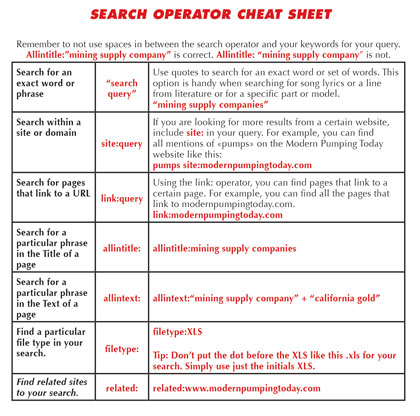With over 30 trillion indexed pages, finding the right information on Google can be a serious challenge. However, there are some nifty ways that you can use Google to find clients that you may be unfamiliar with. By utilizing the following techniques, you will be able to find particular businesses, sensitive documents carelessly left open, or even business opportunities local to you that you may have missed.
ASKING THE RIGHT QUESTIONS, THE RIGHT WAY
Google is a program first and foremost. If you don’t know how to ask the right question, it will spit out what it thinks you want. The way to force Google to give you the right answer is by using what are called Search Operators. A Search Operator is simply a snippet of text you place in the search query you type in. For instance, say you want to find a particular business type that will buy your products which in this instance would be Mining Supply. Normally as a salesperson to find the companies that buy your equipment you would open search and type in Mining Supply Companies and hit search.
The search comes back with over 67 million results, far too many choices to easily search, so let’s try to get that closer to a usable number of more relative results. The first thing to know is that Google sees the first search as three separate words when you enter your search query as above, Mining, Supply, and Companies. Now take the same search and put it into quotation marks, “Mining Supply Companies” and click search. The result comes down to 175,000 results. By adding quotes you took those three words and made a single sentence which is a more specific search type. The quotations make a series of individual words into a single block of text. Leave the quotes off and the words separate into individual items.

KEYWORDS AND SEARCH OPERATORS
Words, specifically keywords, make a huge difference in how your site operates in a search. Have the wrong keywords on your site for your products and you can be losing 75 percent of your business right off the bat—that’s how important keywords are. But 175,000 search results? That’s still too many results to be useful. Enter Search Operators.
Allintitle:
The first Search Operator is called allintitle: The title of your website is critical; it’s one of the primary things a search engine looks at to figure out who/what you are. If you do a search with allintitle: Google will define the search as to only those words that are found in the title of the page. The easiest way to see the title of the page is look to the top of your browser to the top bar that will show the page title. Titles are used to specify pages and are a great way to find what you are looking for.
Open Google Search and type the following allintitle:mining supply companies. You come back with 6480 results! Add the quotes to the search allintitle:”mining supply companies” and it drops to 5400 results. Now, every company that has “Mining Supply Company” in its title is right here, and you can do this with any particular product, brand, or service.
Allintext:
But say your search still isn’t giving you the results you want; maybe the Title of the page has no results for your search you like. Let’s move to the text of the page then. This search is called allintext. Allintext represents a search with any page that has the search term you are looking for in its text. Type in the following allintext:Mining Supply Company and you’ll receive millions of results—far too many. However, if you add quotes to the search like we did above; allintext:”mining supply company”, you’re now down to several hundred thousand results. Remember, unless you specify a particular phrase, Google will break it down into its respective individual words. You—as the user—have to tell it, “no, search this!” And like an obedient pet, Google will give you a better result.
The further you search and break it down, the more optimal and effective your search will be. Let’s see about mining supply companies in California, and we’re going to get even more specific with this little trick. By adding the plus + sign to your search, allintitle:”mining supply company” + California you only get seven results. Compare this with a search in a standard way of mining supply companies in California, and you get 42 million results. As you can see, you can find what you want, when you want it if you know most importantly how to find it.
The Plus Sign
The plus sign is also good in that you can keep adding it to your search. You don’t need the allintitile: or allintext: preface to use it. But it works better for long term searches if you remember to use quotes, for example: “mining supply company” + “California gold” gives even better results. Without the quotations, you get over several million responses. Now remember, these results rely on the words being in the title or text, if they don’t show up try out various combinations of words. It will take some time occasionally to find your niche but once you do find it, it’s almost impossible to miss the opportunities out there. Searching properly and learning how to do it takes time and effort, it is a learned skill-set.
Other Search Operators can do even more nifty tricks. You can search for PDFs, images, email addresses, and so on. And this is a beginning but by no means complete and authoritative list because Google adds more of these every year. What you will want to do, however, is learn a basic understanding of what makes a web page as it will help you focus in the areas you need to with a Search Operator.
Allinurl:
If you start a search with allinurl: Google will restrict your search to whatever is in the URL of what you are searching for. An example, allinurl: california mining supply will return results that contain the words “california”, “mining” , and “supply” in the url.
Here is a fake example site of this search operator in action.
www.examplesite.com /california/gold/supply.html.
See how it is selecting only the pieces of information you want? Allinurl will find the specifics of the names you are looking for within the URLs of a site.
Once you get the basic principles (advanced web-talk for you do this for a few hundred searches) you will begin to not only see patterns in how sites are built but also how information is broken up throughout different industries. Each industry out there after years of having websites up has a sweet-spot of keywords to be searched. I recommend you create an MS Excel file and begin to track these words as you can take that list and do some pretty cool things with it, which we can highlight in later articles.
YOUR CUSTOMERS, COMPETITORS, AND GOOGLE
People often forget the number one use of the internet, which is the easy access of documents and files. By knowing this you can get downright naughty in legally finding information from your competitors and in your industries because Google also reads and archives file-types such as MS Excel, PDFs, MS Word Documents, jpegs, ppt. files, as well as any and every file extension you can think of. Google then dutifully catalogues it for searches. If a company—including yours or your competitors—doesn’t follow good security and puts sensitive material online it is now capable of being searched.
One of my favorite things to do for finding new potential customers is to search for customer lists and purchase orders. The easiest way to begin this type of search is with the filetype: search operator. To do this a search would look like this mining customers filetype:xls. The search operator is generally used at the end of a particular search for best effectiveness. Remember, if you leave the quotes off mining customers, during your search you are searching for two individual words: mining and customers.
As a result, the search mining customers filetype:xls lists over 22,000 Excel files for mining companies including contact lists, previous orders, and so on. A few pages of searching can yield gold. Furthermore, if you were to search mining purchase orders filetype:xls, you now have about 10,000 purchase orders with contact information you can review. Now, type in mining+”purchase orders” filetype:xls and you get only 1010 results, which are all MS Excel purchase orders. You can keep breaking these searches down even further to states, machinery type, or any other relevant data point—the sky is the limit.

GOOGLING FOR GOLD
This is how to use Google to its fullest potential, and once you learn it you will find incredibly good stuff for your efforts. What’s important is that you keep a record of your searches because a few of them will be pure gold for results for you. As you build your search library, you will begin to see the patterns online of your particular industry keyword-wise.
Now remember, you will still have to occasionally dig through pages to find that gold, but you’ve separated the wheat from the chaff as best as you possibly can before you began your task, as a result you are now much more efficient at finding what you want to look for. There are Search Operators for dozens of different types of searches that you can download and put on your desk for quick reference. Download a cheat sheet for yourself and try them out. Remember that you are trying out a new type of search that is very specific and will take some finesse to learn properly.
PUT YOURSELF ON THE MAP
We’ve covered search operators and you now see that you can get very creative finding your information online, but when it comes right down to brutal simplicity for finding customers you just can’t beat Google Maps. Many salespeople have to travel for their jobs. When you are looking for customers you have a contact list you are familiar with and you try to stop by and visit both existing and new customers when you travel. But did you realize you can open Google Maps and not only find new customers but also use the Map so you can plan a more efficient sales trip?
Open Google maps and focus it on the United States and type in “mining” as your search term. You will see thousands of little red dots appear, each representing something related to the mining profession. Change the search to “mining supply” and the field narrows even more. You can even use the above “+” signs of a Search Operator in your map search to narrow your search down further.
Again, this works only if you punch in the correct keywords, and for your profession this may require many different searches before you hit pay dirt, but you will eventually find that magic combination of terms to give you what you want. This is where the file of your saved keywords comes in very handy. As a salesperson, this little trick allows you not only to see your territories fully, but also there’s a map that shows an easier way to do your visits if you go on the road. Do this correctly and you will never be at a loss for new business opportunities and sales as well as getting good info on your competitors. ■
_________________________________________________________________________
ABOUT THE AUTHOR
Brad Miller is the director of marketing at Shanley Pump and Equipment, one of the premier retailers of pumping solutions in the United States. Brad is a leading voice in the role of online marketing and communication for industrial pump manufacturers.
_________________________________________________________________________
MODERN PUMPING TODAY, November 2013
Did you enjoy this article?
Subscribe to the FREE Digital Edition of Modern Pumping Today Magazine!
![]()


